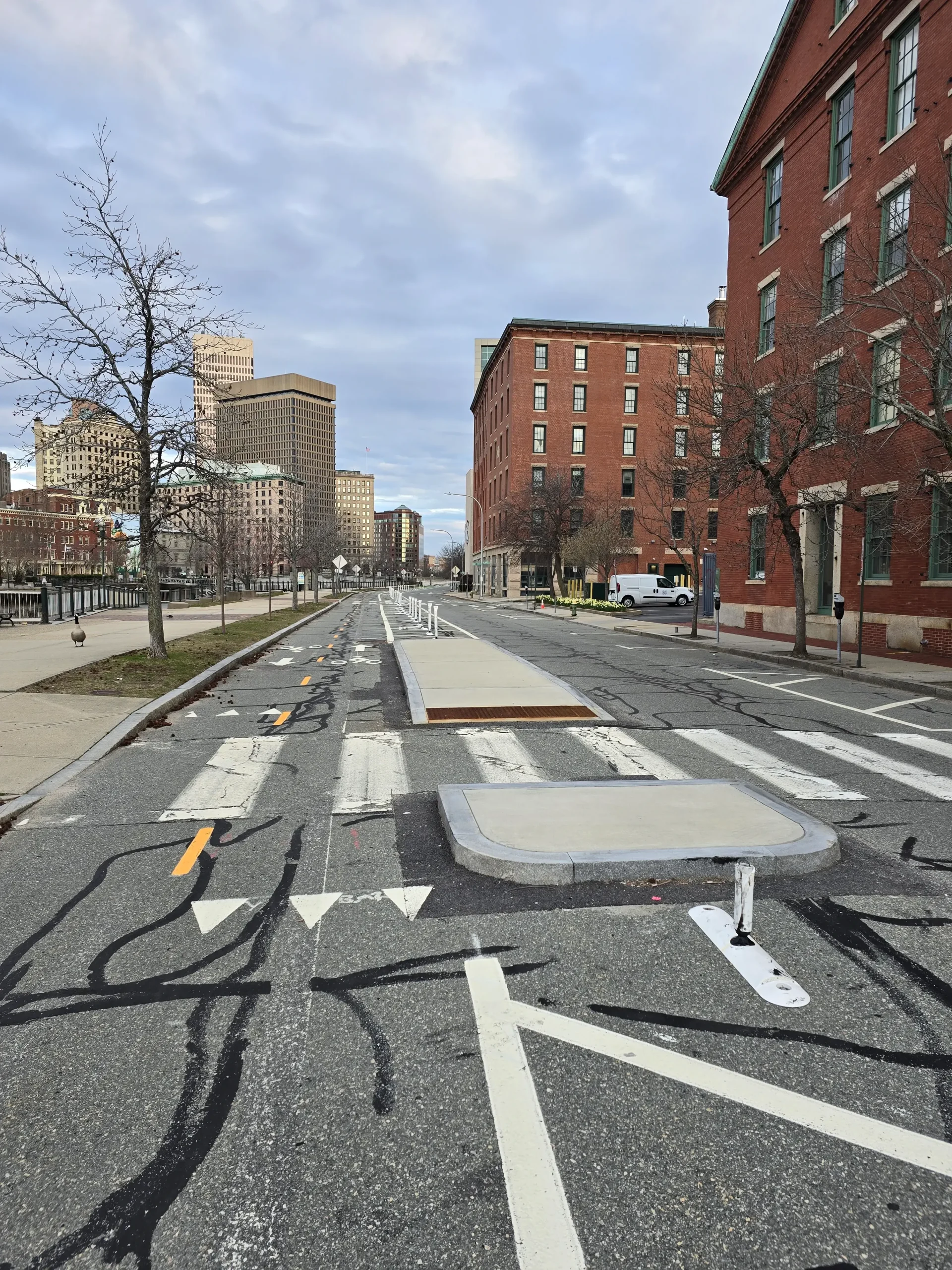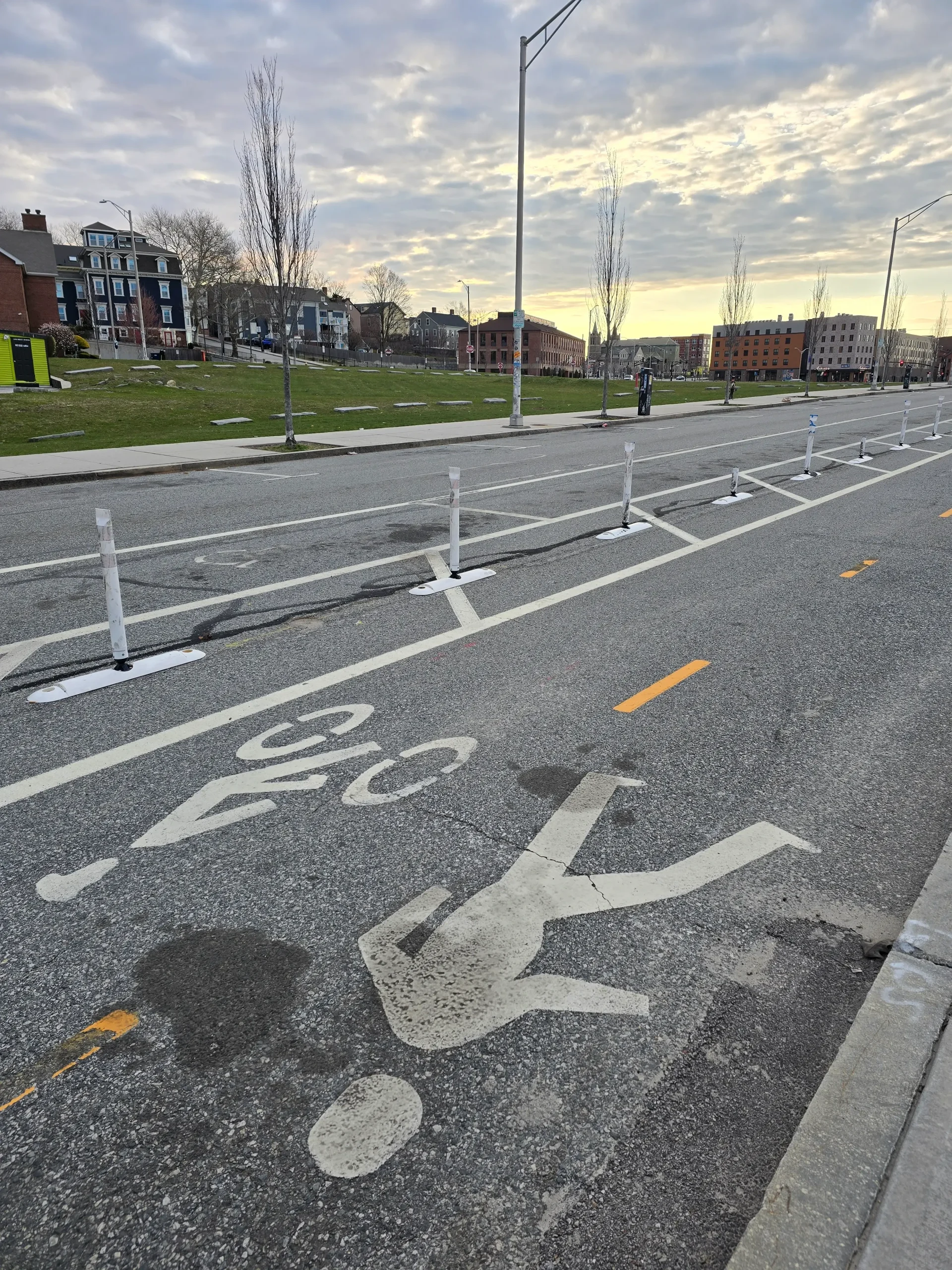In an interview podcast with right-wing local personality Gene Valicenti, Brett Smiley reaffirmed his intent to remove bike lanes and agreed with the interviewer: bicyclists and bus riders are “militants.” Smiley didn’t just take aim at the South Water Street bike path either, but also the one on Broad Street.
The language used throughout this interview is nothing short of deplorable. More importantly, it’s an attempt to control the narrative by labeling those who are most susceptible to transportation-related violence as the aggressors.
VALICENTI: “You’ve said a lot of things that intrigued me in regards to the bike path. You and I have spoken about these bike paths, Elorza put them in, a lot of them aren’t used, and a lot of them—they put some in, they rip them out, it’s a waste of money. Now, you’re thinking of getting rid of the bike path, correct me if I’m wrong, on South Water?”
SMILEY: “That’s right–“
VALICENTI: “… to alleviate the heavier traffic with the bridge out. Are you going to do it mayor?”
SMILEY: “I think so. We’re doing the engineering and planning studies right now. We’ll be making some announcements next week…”
A few moments later…
VALICENTI: “These bike lane people, they’re—some militants. Same thing with the bus people. They want what they want, Mayor.”
SMILEY: “Yeah, I’ve already gotten the pushback, and some of them by the way, provided some good feedback also… one of the things on South Water Street, that pedestrian bridge and the park and the activity that takes place there is very popular, particularly in the summer… I do want to make sure we still have a safe way for pedestrians to cross that park area by South Water Street…”
VALICENTI: “How about that bike path that goes down Broad Street? The most ridiculous thing I’ve ever seen. Broad Street—busy street to begin with—we put a bike path in, we park the cars in the middle of the street, unbelievable, you gonna rip that out? I thought you said you weren’t crazy about that.”
SMILEY: “I have concerns about that one also. That won’t be part of any announcement next week… The Broad Street concern, the business owners there have flagged for me very serious concerns about the inability to have loading, unloading zones, parking for their businesses, and we’ve heard concerns from public safety that because there’s no turn-lane or shoulder, that police cars and fire trucks have a hard time getting down Broad Street. So we’re going to try to solve those problems also…”
Spotify
This interview comes just after Mayor Smiley signed the Green and Complete Streets ordinance, Vision Zero, and was in attendance when Pete Buttigieg visited to announce the expansion of another Providence bike path. Notably, Pete stated in his speech, “More accessibility and not less. More bike and pedestrian connectivity and not less.”
Smiley could be forgetful, but what’s more likely is that he’s trying to play both hands. During his election campaign, in addition to his statements above, his personal interests have aligned with businesses, developers, and the wealthy. In an attempt to appease the masses, however, he signs things that may not necessarily require him to act—non-binding resolutions that look good and, at the same time, could be skirted or easily forgotten about. Basically, it’s all a front as he advances their agendas. In this case, the Washington Bridge fiasco is the perfect cover for what he and his supporters have wanted since his election: dismantling Providence’s bike lanes. This is just the start and will set a precedent for future bike infrastructure demolition.
What’s notable is that these special interests in removing this bike lane (and most others) are nonsensical, to put it lightly. The South Water Street lane sits adjacent to several soon-to-be converted dense housing parcels where bike lanes and public transit will be desperately required. That’s not all, either; it already provides a laundry list of benefits to the entire community, as described by local councilperson John Goncalves. As he wrote, we’ve seen this street before the bike lane. It was scary, essentially another North Main Street: unsafe for humans.
Though what’s missing from Goncalves’ assessment is just that: the human factor. Think about it: how much space do we dedicate to cars? Multiple, wide car lanes in addition to vast parking lots. People—families, kids, etc.—have literally nowhere to go. No place to play or venture out to. You can’t physically get around without a car safely. How can you have a community without human space?
What’s most empty are the critic’s “concerns.” They primarily point to underuse, but that is utterly irrelevant. As described above, even if this bike lane saw zero activity, the benefits it provides are massive. In reality, it is used and will be more prevalent as we start connecting other bike lanes and building a denser city. Interestingly, it’s even used by many of the businesses that initially went against it as vending areas and for other activities. This isn’t just a bike lane; it’s a strip that everyone benefits from but also underappreciates.
Lastly, will this alleviate traffic? No, in fact, it’ll likely increase traffic through the phenomenon known as induced demand. Let’s also not forget what got us into this mess either: car-centricity. With our refusal to invest in public transit and other forms of non-car infrastructure, we’ve never had an efficient way of moving people, and with the bridge needing to be rebuilt, we’re caught with our pants down. Instead of pulling them back up, our reaction is to now take those pants, ignorantly swing them in the air, and make the entire situation worse without addressing the root of the problem.
At least Smiley made one accurate statement: spring has sprung, and with that, we’re going to see even more people in that area. Unfortunately, that may very well mean a bloodbath. With the return to old, how many deaths are we going to see on this street over the summer? Who is to take the blame? Smiley? The Rhode Island Department of Transportation? No matter, all the while, businesses and the wealthy get their cheap win, the people who suffer the most will be the people.


